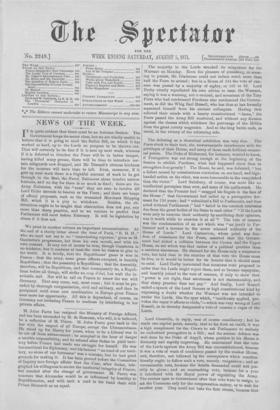The debating as a rhetorical exhibition was very flue. The
Peers stuck to their text, the unwarrantable interference with the privileges of their House, and many of them made brilliant oratori- cal points. The Duke of Richmond, for instance, wanted to know, if Prerogative was not strong enough at the beginning of the Session to abolish Purchase, what had happened since then to strengthen it so greatly ? The House, he said, was defeated, "but a defeat caused by conscientious conviction on one hand, and high- handed action on the other, was more honourable to the vanquished than the victor." Lord Salisbury, of course, was snore like an intellectual porcupine than ever, and some of his quills stuck. He declared that the Premier had "snapped his fingers in the face of the House ;" that Government had called up a prerogative dor- mant for 150 years ; had "submitted a Bill to Parliament, and then acted without Parliament ;" had "failed in the common courtesies. due from the great bodies of the State to each other." "If the Lords were only to exercise their authority by sacrificing their opinions, was it worth while to exercise it at all "? The vote of censure was the condemnation of an act which was "an insult to Par- liament and a menace to the never misused authority of the House of Lords." Lord Carnarvon, whose point was free- dom of conscience for the Peers, asserted that the Govern- ment had risked a collision between the Crown and the Upper House, an act which was that rather of a political gambler than a cautious statesman. He claimed for the House only a suspensive veto, but held that in the exercise of that veto the House must be free, or it would be better for its honour that it should cease to exist. Lord Derby insinuated that measures were proposed in order that the Lords might reject them, and so become unpopular, and heartily joined in the vote of censure, if only to show that "power is not right, that astuteness is not statesmanship, and that sharp practice does not pay." And finally, Lord Russell ended a speech of the Lord Somers or high constitutional kind by expressing a doubt whether the Warrant was not intended to excite the Lords, like the spur which, "insidiously applied, pro- vokes the caper it affects to chide,"—which was very wrong of Lord Russell, as he thereby designated a vote of censure a caper of the Lords.
































